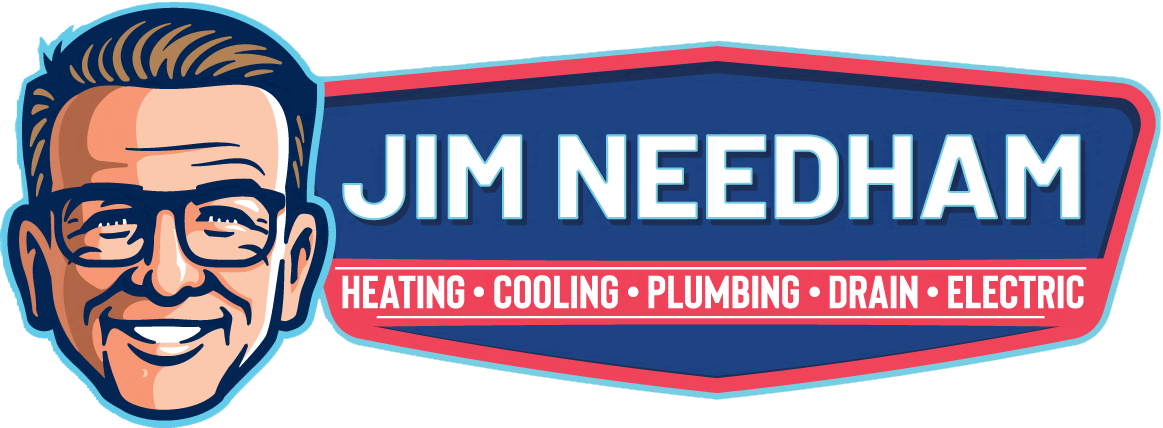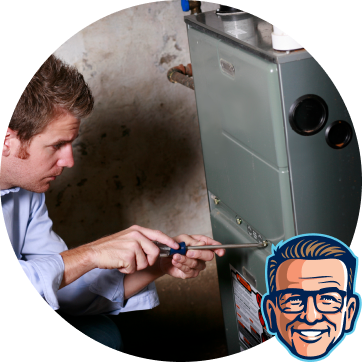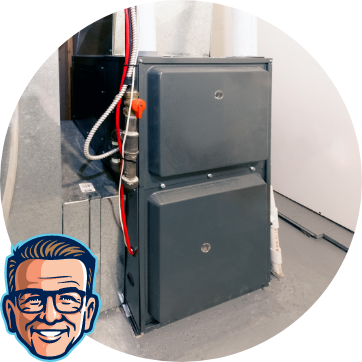My present heat pump does not keep us comfortable. Should I replace it with a larger one?
In most cases, no. The ductwork is already sized for the heat pump itself. So a larger heat pump would need larger ductwork. The problem may be due to undersized ductwork, poor system design or installation. You may need ductwork modifications, a heat load calculation, or possibly an energy audit to find problem areas and correct them.
How do I know if my boiler needs replacing?
A few indications that you may need to replace your boiler include frequent breakdowns, higher bills, your water and/or house not heating sufficiently, and/or unexplained noises. If you notice any of these problems with your boiler, you will probably benefit from replacing it with a new one as these are all indications that your boiler could fail soon, and the costly repairs will only continue. Call Jim Needham Heating Cooling Plumbing and Drain to have a heating expert consult with you on installing a new boiler and even provide you with an estimate before installing anything.
Prior to calling for service, what do I need to know about my furnace?
Prior to calling Jim Needham Heating Cooling Plumbing and Drain for service, you will need to know the make and model of your furnace, double check that your furnace is in the correct mode depending on the season, assure that your system has power, and lastly, ensure that the battery in your thermostat is in good working condition.
How Much Does a New Furnace Installation Cost In CO?
Your furnace is a large, complex unit that will deliver years of exceptional heating to your entire home. It is important that it’s installed correctly, otherwise this costly investment can go to waste. Multiple factors determine the overall cost of a new furnace installation, but the type of furnace you choose has the largest impact. Our expert HVAC technicians at Jim Needham Heating Cooling Plumbing and Drain will help you find the perfect furnace to install that’s best for your Denver, Colorado home. The 3 main types of new furnace installations available are:
Gas Furnace Installation & Replacement
Gas furnaces are the most commonly installed furnaces in Denver homes. More efficient than installed oil furnaces, but less than electric, gas furnaces are typically the cheapest to run, as they use natural gas as an energy source. With this, your home runs the risk of creating a buildup of carbon monoxide, and your furnace will require on-going maintenance throughout its life. Gas furnaces are, however, the least expensive model to run using natural gas, making them a favorable choice for furnace replacement.
Electric Furnace Installation & Replacement
The electric furnace is another popular choice for homeowners. Electric furnace installations are less expensive, as they require only electricity and not natural gas line piping installation or oil storage tanks. On the flip-side, electrical furnaces are the most expensive to run due to their high usage of electricity. Electric furnaces still remain a common furnace replacement option with their comparatively lower purchase costs & minimal lifespan maintenance. Ask an HVAC expert from Jim Needham Heating Cooling Plumbing and Drain today if the cost of an electric furnace installation is worthwhile for your home.
Oil Furnace Installation & Replacement
Oil furnaces are not what they once were in Denver, Colorado, but they still offer some attractive benefits. Oil furnaces are able to heat large spaces evenly & have less emissions than gas furnaces, with no risk of carbon monoxide leakage in your home. However, oil furnaces do require an on-site oil storage tank for fuel & an oil delivery service. Oil is typically more expensive than natural gas and has the lowest efficiency rating for heating per its energy source, however, this depends largely on your Denver, Colorado location. Call us today to schedule a furnace installation cost estimation to see if an oil furnace installation is the right fit for your home.
No matter the problem, our Denver, Colorado furnace installation technicians will determine your heating & furnace needs and finances before any work is done, so you will know what solution is best & most affordable for your new furnace system.
Think you may be due for a new furnace installation? Ask an expert from Jim Needham Heating Cooling Plumbing and Drain below for fast answers & get reliable service that your neighbors trust!
How long does a typical furnace last?
Furnaces typically last for about 15 to 20 years. Elements that can affect your furnace’s lifespan include the environment in which you live, maintenance, and grade of your equipment. Having the proper maintenance done professionally by Jim Needham Heating Cooling Plumbing and Drain every year will make the biggest impact on how long your furnace lasts. Lastly, when purchasing a furnace, it will end up saving you money in the long run to buy a higher-grade system. They handle better, last longer, and are usually more energy efficient which means you will save money on your monthly bills.
Do high-efficiency furnaces really save money?
Yes, high-efficiency furnaces will absolutely save you money. Furnace efficiency is rated by the government by how much gas comes in vs. how much heat is delivered into the home. Furnaces that are higher in efficiency are safer, cleaner, and because they work less hard, cost you less to run them.
Will a new furnace save me money?
Yes, a new furnace will very likely save you money as furnaces are only replaced every 15 to 20 years. With the advancement of today’s technology, the chances of there being a much more energy efficient model available, are sky-high. The more energy efficient the furnace is, the more money it will save you. If you’re thinking of replacing your furnace, call Jim Needham Heating Cooling Plumbing and Drain to have a heating and cooling expert guide you in choosing the right sized furnace that your home will need.



